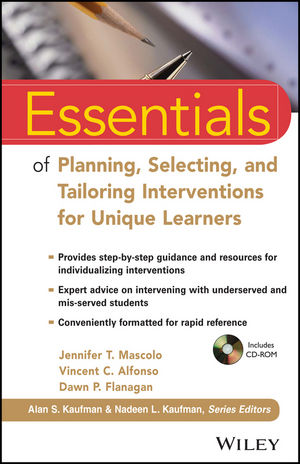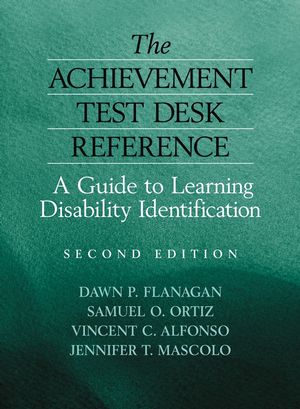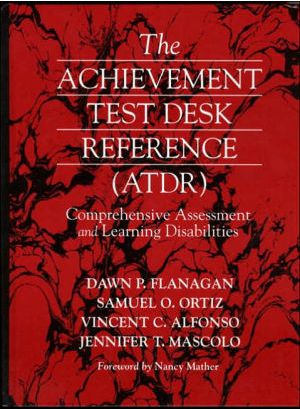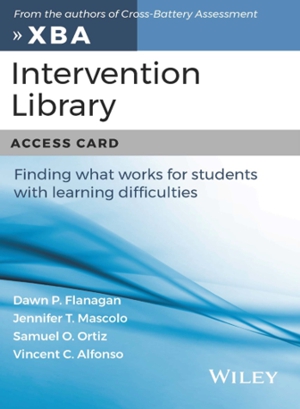
Essentials for Unique Learners
This authoritative resource provides step-by-step procedures for planning, selecting, and tailoring interventions for at-risk learners with a unique focus on how to individualize interventions using actual case ex A Resource for Designing and Implementing Intervention Programs for At-Risk Learners This authoritative resource provides step-by-step procedures for planning, selecting, and tailoring interventions for at-risk learners with a unique focus on how to individualize interventions using actual case examples. In addition, this volume offers guidelines for gathering and interpreting data in a manner that assists in identifying targets for intervention and rich discussion and information relating to specific academic, cognitive, and behavioral manifestations of students with learning difficulties in reading, math, writing, and oral language. Practitioners will also recognize and learn how to intervene with students from underserved and mis-served populations who are at risk for learning failure including English-language learners and students from impoverished environments. Each chapter describes how specific difficulties interfere with classroom tasks and explain how to select, modify, or otherwise tailor an intervention based on that information. As with all volumes in the Essentials of Psychological Assessment series, this volume includes callout boxes highlighting key concepts, extensive illustrative material, and test questions. The companion CD-ROM provides additional worksheets, case studies, and handouts.

The Achievement Test Desk Reference
An up-to-date resource with the latest achievement tests, theories, and evidence-based findings The Second Edition of this critically acclaimed reference features the most up-to-date versions of assessment instruments to measure individual achievement and learning disabilities. The authors’ pragmatic approach offers practitioners an innovative, systematic assessment framework that applies Cattell-Horn-Carroll (CHC) cognitive theory and blends cognitive testing and Response-to-Intervention (RTI) methods into one seamless process for diagnosing learning disabilities. Replete with case studies, checklists, and worksheets, this reference assists practitioners in choosing appropriate tests, organizing comprehensive assessments, and interpreting results using a cross-battery approach. * Part One focuses on the evaluation and identification of learning disabilities, particularly from the perspective of IDEA 2004. Current cognitive theory, research, assessment methods, and interpretive techniques are all set forth and reviewed. * Part Two is the “Desk Reference” section. It features descriptions and reviews of the psychometric, theoretical, and qualitative features of more than 50 achievement tests published between 1995 and 2006. Separate chapters are devoted to comprehensive tests of academic achievement and brief screening tests of academic achievement, as well as separate chapters for tests of reading, math, written language, oral language, and phonological processing. * Part Three provides a comprehensive, step-by-step explanation of evaluating suspected learning disabilities according to IDEA 2004 guidelines, using the principles and procedures described in the previous two parts. This reference concludes with fifteen appendices providing practitioners with a host of useful information and tools, including reproducible worksheets, conversion tables, and learning disability resources. Grounded in CHC theory and a cross-battery approach to assessment, this is an essential resource for school psychologists and other practitioners who need to assess learning disabilities.

The Achievement Test Desk Reference (ATDR)
This book combines comprehensive descriptions and critical reviews of over 50 achievement tests with an innovative model for learning disability evaluation following current assessment and interpretation methods. The Achievement Test Desk Reference (ATDR) represents a unique contribution to both the practice of academic assessment and learning disability evaluation. The “Desk Reference” section contains descriptions and reviews of psychometric properties for comprehensive screening and specific academic skills batteries and achievement tests including measures of reading, math, written and oral language, and phonological processing. For school psychologists, clinical psychologists, educational psychologists, learning disability specialists, and speech/language pathologists.

Intervention Library
The Intervention Library is a compilation of over 1000 entries that are uniquely organized into five categories, including Instructional, Environmental, Curricular, Remediation Techniques and Programs, and Skill Building and Compensatory Strategies. A wide variety of interventions are included in each of these categories to address a student’s unique learning needs across the eight academic areas listed in IDEA. Furthermore, when information is available about a student’s area(s) of cognitive weakness, interventions in each of the five categories are also available to assist with minimizing the effects of the weakness thereby allowing the student greater access to instruction and the curriculum.
Supporting Learners. Improving Outcomes.
